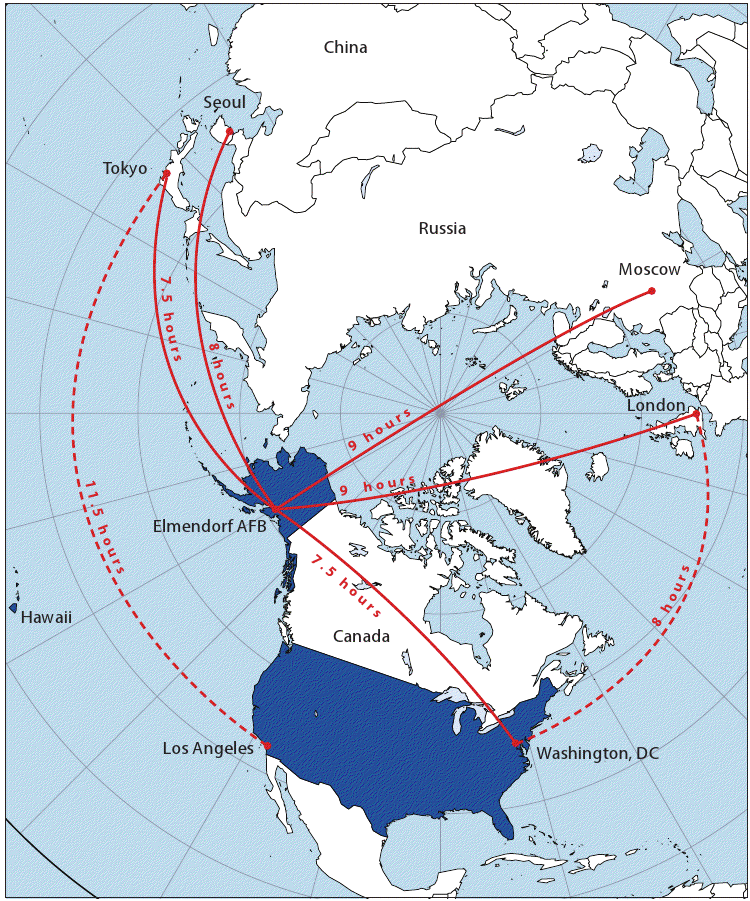Explain how Alaska's location was considered 'strategic' during World War II. What were the war activities/events that supported the perspective of 'strategic' Alaska.
"As Putin rears his head and comes into the air space of the United States of America, where– where do they go? It's Alaska. It's just right over the border." --Sarah Palin, explaining why Alaska's proximity to Russia gives her foreign policy experience, interview with CBS's Katie Couric, Sept. 24, 2008
Sarah Palin may not have been entirely wrong when giving her infamous, 'I can see Russia from my house,' quote. Alaska was geographically significant during World War II and continues to be now. During World War II Alaska was a military crossroads. Three countries found Alaska pivotal in their campaigns, Japan, the U.S. and Russia.
Japan -
After Japan declared war on the United States it needed to secure a foothold for men and material. Hawaii, the more well known attack on the U.S., was not an obvious holding. The Hawaiian islands are grouped in a relatively small part of the Pacific. An immense oversea supply line would be needed to hold Hawaii. Also, Hawaii would only serve as a way station in building another lengthy supply line to the mainland of the U.S. terminating in California with multiple U.S. naval and army bases. The Japanese never intended for Hawaii to be anything more than a single military engagement to wipe out the American naval threat in the Pacific for the next several years. Alaska would be the real target for waging a prolonged war against the U.S.
Alaska's Aleutian island chain formed a semblance of an overland route to the United States. This "overland" route was much more accessible to Japan than Hawaii. Also, Alaska at this point was underpopulated and underdeveloped militarily. The combination of location, geography and lack of U.S. infrastructure made Alaska the obvious sustained military target.
Russia -
Russia was ill prepared for World War II. Russia's problem in fighting a sustained land war against Germany had not changed a great deal since World War I. Russian had not solved its problems of lack of infrastructure and shortage of quality civilian or military leadership. The United States being slow to enter WWII was ill prepared for a fight once the decision was made for us by Japan. With a two front war to be fought we needed allies that could, at the very least, fight by proxy until we reached full strength. Russia was that ally against the Germans on the Eastern front. Using the ALSIB project the U.S. was able to bolster the Russians and their campaign against the Nazis. Alaska was, and is today, the obvious choice for flying into Russian airspace.
U.S. -
The U.S. used Alaska as a buffer territory to help defend the lower 48 from Japanese attacks and to help supply our then ally, Russia.
Strategic Alaska

Source: http://www.alaskapublic.org/2012/02/24/addressing-potential-impacts-of-base-realignment-and-closure-act-brac-on-alaskan-communities/
Explain:
Consider the large military presence in Alaska today, and the impact of that population on our Alaska culture.
The presence of the U.S. military on Alaskan culture today cannot be overstated. Anchorage is a microcosm of how much an impact the military is on Alaska. Anchorage is home to the largest military base in Alaska. This means we have the largest number of active military member in Alaska (Alaska having the largest number of veterans per capita of all 50 states). Having a population built from active and retired service members means Anchorage is culturally sensitive to all aspects of military life, including the most tragic. Recently, the voters in Anchorage (many active and retired service members) approved a proposition to help military widows. Proposition 7, as it appeared on the ballot, shows just how significant the military is to the people/culture of Anchorage, and Alaska.
Prop 7, property tax exemption for widows or widowers of those killed while serving in the U.S. military: This proposition would allow the city to offer an exemption for up to $150,000 of a home's value. This is a tangible way of helping our military families when they most need it.
Source: http://www.adn.com/2012/04/01/2402436/our-view-ballot-propositions.html
Consider the impact of the federal spending on the Alaska economy.
Many Alaskans are highly critical of the federal government but without federal dollars Alaska would instantly be vaulted back to pre-WWII territory status. A study was conducted by UAA in 2006 by Scott Goldsmith. The study shows that the federal government spent $9.25 billion on Alaska in that year alone, $3 billion of that solely for the military. The study also points out that if federal spending in Alaska is reduced in what are called vulnerable spending areas, Alaska could see the loss of up to 20,000 jobs. Oil and mineral wealth could offset the loss of federal dollars in part but the point remains, Alaska and the federal government are intertwined. Alaska was purchased by the U.S. government, developed by the U.S. government and is in part maintained by the U.S. government today.
Source: http://iser.uaa.alaska.edu/Publications/webnote/Federal_Spending2008.pdf
Evaluate:
This unit on its own was interesting. I have heard bits and pieces of what had happened in Alaska during WWII but did not have a complete picture. This unit served to combine and flesh out how pivotal Alaska was for the war effort. The unit is best used in a U.S. History, AK studies or even world History context. However, the above 'Explain' questions were items that I have brought up in my own Government classroom. Alaska's state issues are great jumping off points for continued discussion on the U.S. Government. BRAC closures, Anchorage port, mayoral races, Prop 5 & 7, all segway nicely to full discussions of military spending, the wars in Afghanistan and Iraq, potential conflict with Iran or North Korea, the commerce clause and equal protection. Alaska is eight hours away from anywhere in the world by air and just as centrally located in many American debates.
Site Hopper:
- http://underwoodexploresalaska.blogspot.com/
- http://myalaskanexploration.blogspot.com/
- http://peterbenoitalaskablog.blogspot.com/
No comments:
Post a Comment